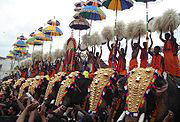The name Kerala has an uncertain etymology. Keralam കേരളം may stem from the Classical Tamil chera-alam ("declivity of a hill or a mountain slope") or chera alam ("Land of the Cheras"). Kerala may represent an imperfect Malayalam portmanteau fusing kera ("coconut palm tree") and alam ("land" or "location"). Natives of Kerala, known as Malayalis or Keralites, refer to their land as Keralam.
A 3rd-century-BC Asokan rock inscription mentioning a state or people called "Keralaputra" is the earliest surviving attestation to the name Kerala. In written records, Kerala was mentioned in the Sanskrit epic Aitareya Aranyaka. Additionally, Katyayana, Patanjali, Pliny the Elder, and the unknown author of the Periplus of the Erythraean Sea displayed familiarity with Kerala. In the last centuries BC, the region became famous among the Greeks and Romans for its spices, particularly black pepper.
Malayalam (മലയാളം malayāḷaṁ) is a Dravidian language used predominantly in the state of Kerala, in southern India. It is one of the 22 official languages of India, and it is used by around 36 million people. Malayalam is also widely used in the union territories of Lakshadweep and Mahé, the Kanyakumari district of Tamil Nadu, and Dakshina Kannada, and Kodagu districts of Karnataka. It is also used by a large population of Indian expatriates living in Arab States, the United Kingdom, the United States,Singapore, Australia, and Canada.
Malayalam formed out of Proto-Dravidian rather late and began developing a body of literature by the 9th century CE. Before Malayalam came into being, Proto-Dravidian was used in literature and courts of a region called Tamilakam. The modern Tamil language also developed from this Proto-Dravidian. Malayalam uses a large proportion of Sanskrit vocabulary. Loans have also been made from Portuguese, Arabic, Syriac, and in more recent times English.
|


